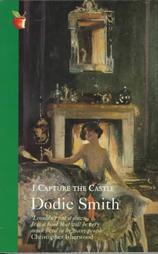I Capture the Castle is one of the best books about how people form relationships I’ve ever read, and it has one of the best first person voices in the history of the universe. I have read it too many times to count and I love it almost too much to be coherent about it.
Cassandra Mortmain is seventeen and lives in a rented crumbling castle in 1930’s England. She lives there with her eccentric writer father, her lute-playing naturist stepmother Topaz, her beautiful but discontented sister Rose, her younger brother Thomas and the beautiful Stephen, who is the son of a deceased servant. They’re living on next to no money and are frequently hungry. Then the Cotton family arrive at Scroatney Hall and enter their lives, turning everything upside down.
The thing that makes the book truly charming is Cassandra simultaneously taking the oddest things for granted and consciously examining everything. I’ve called the voice “first person headlong,” it’s written in the form of a journal where she knows within each chapter what she’s describing, but doesn’t have any longer perspective on it than that.
What happens, the events of the book, is normal enough: dinner parties, falling in love, dancing, starting to write a book. What makes it worth reading and reading and re-reading is the close up intimate view of the universe. Cassandra’s voice is both adult and child, sophisticated and naive, observant but unaware, simultaneously taking herself very seriously and laughing at herself.
I write this sitting in the kitchen sink. That is, my feet are in it. The rest of me is on the draining board, which I have padded with our dog’s blanket and the tea-cosy. I can’t say that I am really comfortable, and there is a depressing smell of carbolic soap, but this is the only part of the kitchen where there is any daylight left. And I have found that sitting in a place where you haven’t sat before can be very inspiring. I wrote my very best poem while sitting on the hen house. Though even that isn’t a very good poem. I have decided my poetry is so bad I mustn’t write any more of it.
That’s how it begins. It isn’t really a romance, in any sense of the word, it’s an internal voyage of discovery. It’s also wonderfully funny.
It really is agony to talk to her about books. When I was longing for a calm discussion of Tolstoy’s War and Peace she said “Ah, it’s the overlapping dimensions that are so wonderful. I tried to paint it once on a circular canvas”—and then she couldn’t remember who Natasha was.
The book it is most like is, I suppose, Stella Gibbons’s Cold Comfort Farm, which is set at about the same date in the English countryside and has a female first person narrator. I can’t help liking it much better. I think it’s because it takes its own level of reality much more seriously. That’s probably why it works much less well as a film—CCF is a satire and made a pretty good film, but the fairly recent film of I Capture the Castle was shallow and consciously naive. There are things one can accept entirely from within the filter of perception that become silly when you’re supposed to sit and watch them from outside. There are books that just shouldn’t be made into films, and this is one of them.
Oh, and it isn’t SF. But I originally read I Capture the Castle more than thirty years ago now, because I’d enjoyed her SF. A Hundred and One Dalmatians is a talking-animal book, but the sequel, The Starlight Barking is definitely and unquestionable SF, with aliens and everything.










